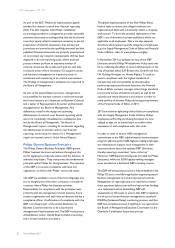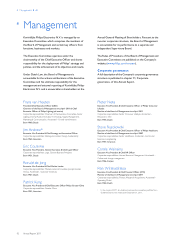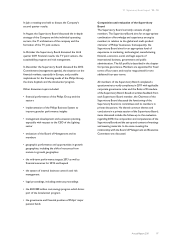Philips 2011 Annual Report Download - page 89
Download and view the complete annual report
Please find page 89 of the 2011 Philips annual report below. You can navigate through the pages in the report by either clicking on the pages listed below, or by using the keyword search tool below to find specific information within the annual report.7 Risk management 7.5 - 7.5
Annual Report 2011 89
importance, and the dependency on the funding available
for healthcare systems. In addition, changes in
reimbursement policies may affect spending on
healthcare.
Philips is exposed to non-compliance with General
Business Principles.
Philips’ attempts to realize its growth targets could
expose it to the risk of non-compliance with the Philips
General Business Principles, in particular anti-bribery
provisions. This risk is heightened in growth geographies
as corporate governance systems, including information
structures and the monitoring of ethical standards, are
less developed in growth geographies compared to
mature geographies. Examples include commission
payments to third parties, remuneration payments to
agents, distributors, commissioners and the like
(‘Agents’), and the acceptance of gifts, which may be
considered in some markets to be normal local business
practice. (See also note 25, Contingent liabilities.)
Defective internal controls would adversely affect our
financial reporting and management process.
The reliability of reporting is important in ensuring that
management decisions for steering the businesses and
managing both top-line and bottom-line growth are based
on top-quality data. Flaws in internal control systems
could adversely affect the financial position and results and
hamper expected growth.
The correctness of disclosures provides investors and
other market professionals with significant information
for a better understanding of Philips’ businesses.
Imperfections or lack of clarity in the disclosures could
create market uncertainty regarding the reliability of the
data presented and could have a negative impact on the
Philips share price.
The reliability of revenue and expenditure data is key for
steering the business and for managing top-line and
bottom-line growth. The long lifecycle of healthcare sales,
from order acceptance to accepted installation, together
with the complexity of the accounting rules for when
revenue can be recognized in the accounts, presents a
challenge in terms of ensuring there is consistency of
application of the accounting rules throughout Philips
Healthcare’s global business.
Compliance procedures have been adopted by
management to ensure that the use of resources is
consistent with laws, regulations and policies, and that
resources are safeguarded against waste, loss and misuse.
Ineffective compliance procedures relating to the use of
resources could have an adverse effect on the financial
condition and operating results.
Philips is exposed to non-compliance with data privacy
and product safety laws.
Philips’ brand image and reputation would be adversely
impacted by non-compliance with the various (patient)
data protection and (medical) product security laws. In
particular, Philips Healthcare is subject to various data
protection and safety laws. Privacy and product safety and
security issues may arise, especially with respect to
remote access or monitoring of patient data or loss of
data on our customers’ systems, although Philips
Healthcare contractually limits liability, where permitted.
Philips operates in a highly regulated product safety and
quality environment. Philips’ products are subject to
regulation by various government agencies, including the
FDA (US) and comparable foreign agencies. Obtaining
their approval is costly and time consuming, but a
prerequisite for market introduction. A delay or inability
to obtain the necessary regulatory approvals for new
products could have a material adverse effect on business.
The risk exists that product safety incidents or user
concerns could trigger FDA business reviews which, if
failed, could lead to business interruption which in turn
could adversely affect Philips’ financial condition and
operating results.
























